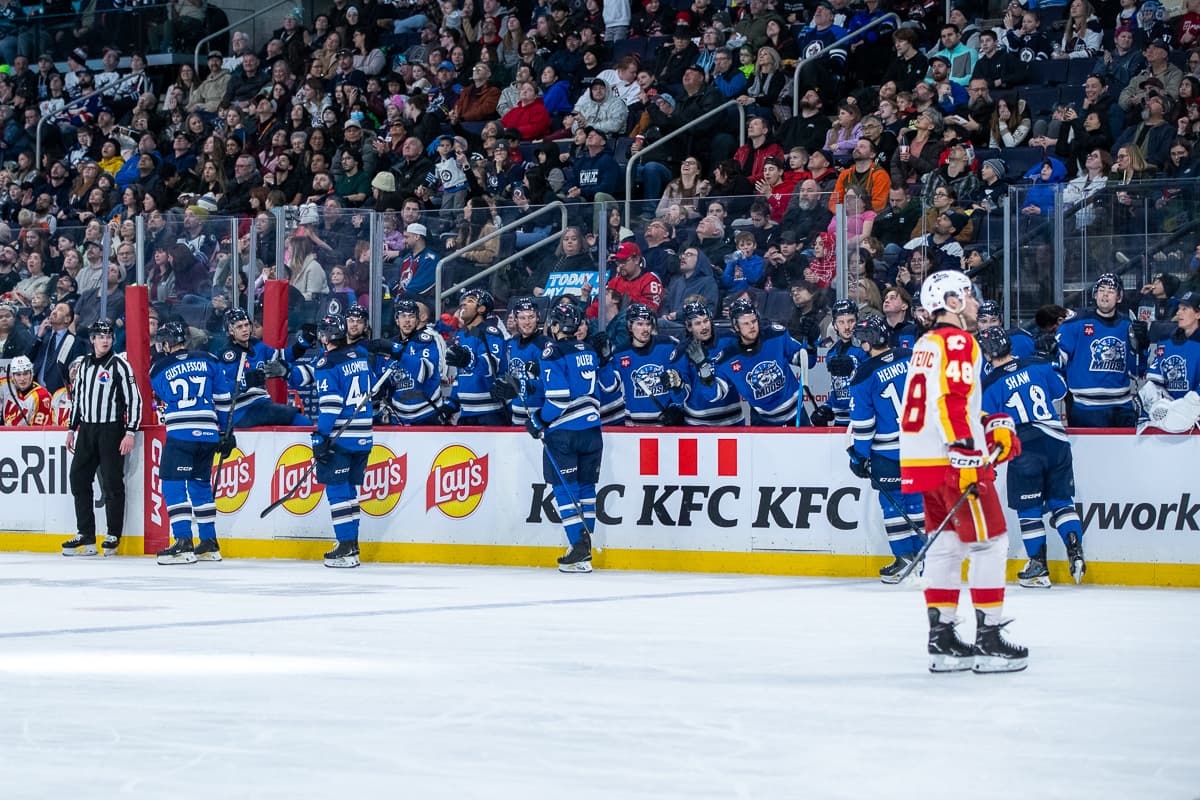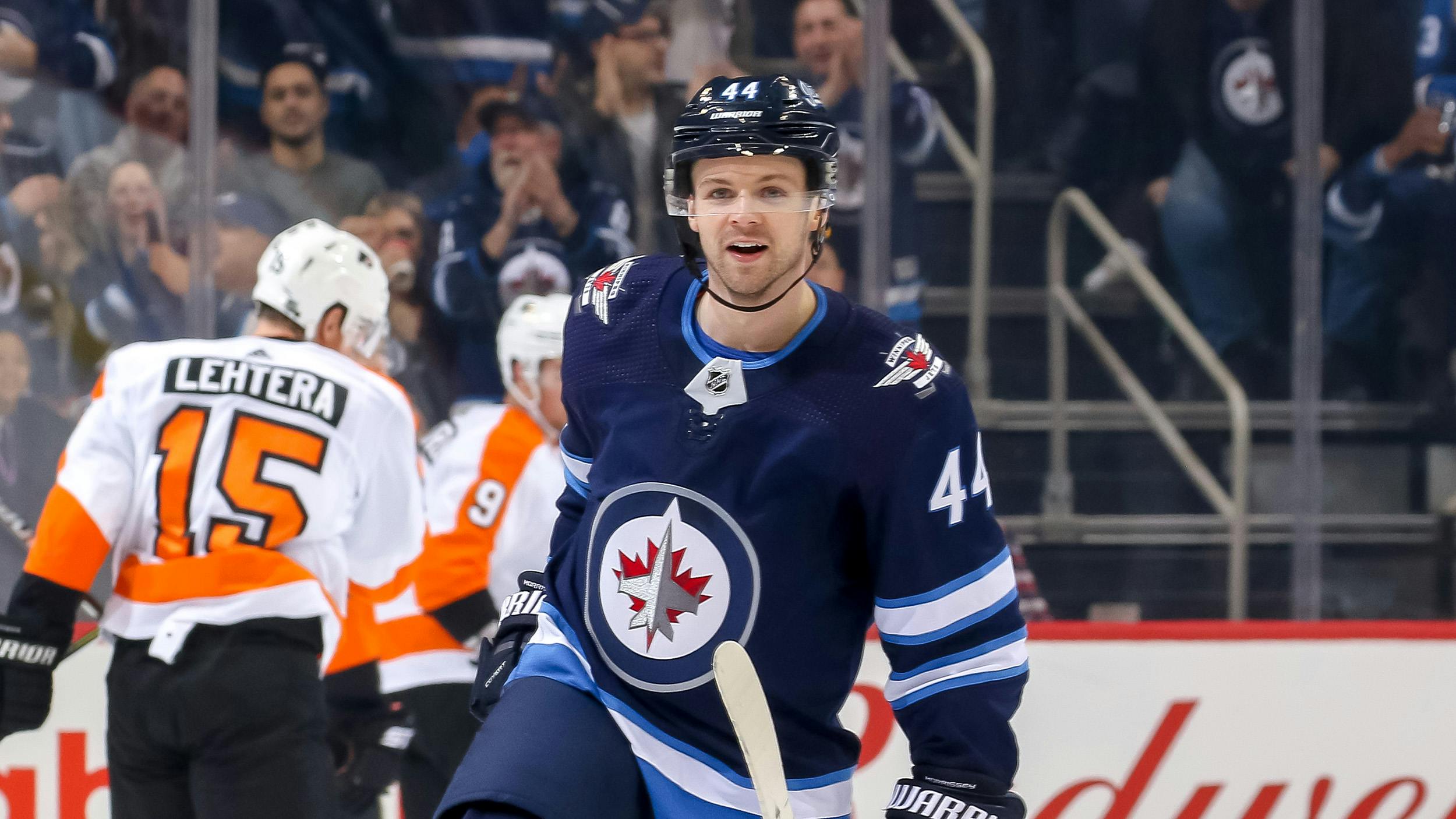There are mixed feelings around the Jets’ fan base about what this “evolving” Winnipeg team can accomplish this season. Blake Wheeler and Pierre-Luc Dubois are gone, a trio of ex-Kings are now Jets, and Mark Scheifele and Connor Hellebuyck remain surrounded in a haze of uncertainty.
But let's not dismiss the fact that this new version of the Jets still has a talented lineup capable of winning games. Especially against their own division; the Central is wide open.
So really, the formula for the Jets to make the playoffs is quite simple. Perform well against your own division. This is why inter-divisional games are often referred to as having a “four-point” significance. Win, and not only do you collect two points, but the team you defeat loses the opportunity to bank their own two points — the net result equaling four points.
Last season, the Jets landed the final wildcard position to qualify for the playoffs, thanks in large part to an 18-8 record against their own (Central) division in which they collected 36 of their 95 points. On the flip side, they combined for a 15-17 record against the Eastern Conference’s Metro and Atlantic division teams. Not great. So, while I don’t anticipate Winnipeg’s record against the East improving, due in part to the grind of travel and the overall strength of the conference, the Jets still have a viable path to replicating a strong performance against their own division in order to earn another playoff berth — and ideally that all-important third place Central finish.
However, this success might very well come down to how Winnipeg matches up against three key divisional opponents. Let’s play a game of elimination.
At the top of the Central are the Colorado Avalanche, once again primed to take a run at the Cup, and the Dallas Stars, a roster quickly developing into one of the League’s most complete. So let's assume — barring major injuries or any other unforeseen developments — that the Aves and Stars earn the two top spots in the Central. Sure, the Jets still need to pick up some wins against these teams, but a season-series result close to .500, such as the 2-2 record the Jets managed versus Colorado last season, should be all that can be realistically expected.
At the other end of the spectrum are the Arizona Coyotes and Chicago Blackhawks who are still in rebuild mode and teams the Jets need to — and should — dominate in order to make the playoffs. Last season, the Jets combined for a record of 7-0 against these basement dwellers (*not a big deal). But is that repeatable? Arizona’s roster looks deeper, and Chicago will be boosted by the “Traveling Bedard Show.” Winnipeg would be foolish not to fully prepare for these “expected-to-win” matchups. It's the NHL after all. The level of parody is much higher than most other major sports leagues. Just ask my PlayNow account.
So this leaves us with the teams in the Central that, depending on how the Jets perform against them, will ultimately decide Winnipeg’s playoff fate.
Nashville Predators, St. Louis Blues, Minnesota Wild.
Last season, Nashville finished with 42 wins — only three points behind Winnipeg for the final playoff spot. So, as you can see, the Jets’ 3-1 season-series record against the Preds was critical to stay ahead of Nashville in earning that final playoff spot.
But, like Winnipeg, Nashville’s roster went through significant change this offseason. Subtractions of Matt Duchene and Ryan Johansen gave way to the signings of Ryan O’Reilly, Luke Schenn, and Gustav Nyquist. However, the real X-factor this upcoming season in “Smashville” will be the continued development of their young, homegrown forward group.
Last season, the Preds ranked a dismal 27th overall in goals-for. Not exactly filling the net. Subsequently, this weakness was something the Jets exposed in head-to-head matchups against Nashville, allowing only five goals over four games. But the progression of Luke Evangelista, Thomas Novak, and Juuso Parssinen, combining for 83 points in 120 games across much of their first taste of NHL action last season, should be enough to help rejuvenate Nashville’s finishing ability alongside perennial top scorers Roman Josi and Filip Forsberg. Simply put, this Nashville offense may be equally as dangerous as Winnipeg’s this season.
Defensively, however, is where the Jets have an edge. While both teams deploy a potential Vezina winning goaltender — Juuse Saros ranked fourth in voting last season, one spot behind Hellebuyck — Winnipeg’s top-six defensive-unit should be a difference maker. Sure, the Preds have Roman Josi, one year removed from his 96-point campaign and always a threat to take over a game on his own, but questions surround much of the remaining defensive core that struggled at times in their own end last season.
However, with new head coach Andrew Brunette on board and the legend himself Barry Trotz at the helm upstairs, looking to put his own stamp on this team, you can bet Nashville isn’t quite ready to call it a rebuild. Look for the Jets to play close, critical games against the Preds this season in which a win or loss may be the difference between making the playoffs or not.
The St Louis Blues’ 2022-23 season was their worst in 15 years. It was a significant backstep for an organization that hasn't missed the playoffs since winning the Stanley Cup in 2018-19.
There’s no way to sugar-coat it. Starting goaltender Jordan Binnington tantrumed his way to a 3.31 GAA and .894 SV% on the season (as well as a two-game suspension for an incident against Minnesota), and leading scorer Jordan Kyrou’s -38 plus/minus would have set a PGA Tour four-round scoring record.
On par with taking advantage of the Blues’ struggles like much of the rest of the league did, the Jets finished the season-series matchup vs. St. Louis with a 3-1 record, scoring 13 goals along the way.
So, how do the Jets project against the 2023-24 version of the Blues? Well, St. Louis’ organizational direction is a bit of a head-scratcher. Although GM Doug Armstrong shipped out Ryan O’Reilly and Vladimir Tarasenko for picks and prospects — evidently sensing a lost season — he also added NHL veteran forwards with upside in Kevin Hayes, Kasperi Kapanen, and Jakub Vrana. I guess, similar to the Jets, this iteration of the Blues is still hoping to be competitive. The messaging being “retooling not rebuilding.”
On paper, the Jets and Blues match up fairly closely. Robert Thomas and Jordan Kyrou are similar offensive weapons to Ehlers and Connor, and, sure, maybe we can say Mark Scheifele edges out Brayden Schenn slightly as a higher-ceiling-centre on the plus side of 30.
But while the Jets’ top-six defensive unit has only three players over 30, the Blues’ D-core is truly an elderly bunch — for NHL standards at least. In fact, the Blues’ top five defensemen — Nick Leddy, Torey Krug, Justin Faulk, Colton Parayko, and Marco Scandella — are all between the ages of 30 and 33.
The verdict? If Connor Hellebuyck can continue to substantially outperform Jordan Binnington in goal (as he's done) and the Jets continue to expose the Blue’s aging defensemen (as they did), this Central matchup could be one more well-placed Jenga cube at the top of Winnipeg’s hopes for a top-three divisional finish. So far so good.
Oh, but what about the Wild…
Okay. So, If a winning record against middling Nashville and St. Louis is part of the key for the Jets making the playoffs next season, doing the same against the Minnesota Wild is the big ask.
Last season, the Wild qualified for the playoffs eight points clear of the Jets (in that coveted Central Division third-place position) before bowing out in the first round to Dallas.
Head-to-head, the Jets mustered just one win in four games against the Wild, not to mention a minus-eight goal differential. But, because the Jets can't rely on repeating another 7-0 record against the Coyotes and Hawks this season, let's entertain the expectation that it's simply imperative Winnipeg finds a way to at least split the season series against Minnesota if they want a realistic shot at the postseason.
The biggest offseason subtraction for the Wild was veteran defenseman Matt Dumba. However, this impact should be blunted by top defensive prospect Brock Faber, likely stepping right into a top-four role on the backend.
So, how does Winnipeg steal wins from a team that dominated them a year ago and is basically unchanged? Answer: Improved forward depth that is willing to sacrifice offense for a defensive structure that limits chances against. This is the strategy that will be especially crucial against a Wild team that boasts a couple of the most dangerous young forwards in the game — Kirill Kaprizov and Matthew Boldy. In other words, Don’t. Trade. Chances.
First off, Winnipeg’s third line, featuring Adam Lowry down the middle, will need to be borderline elite at shutting down offense (all hail the Lowry Work Ethic — hopefully, it rubs off on the rest of the Jets’ lineup). Secondly, the newcomers from LA will need to add a layer of two-way defensive play to the lineup that Jets fans haven’t seen much of in recent years.
Newcomer Gabe Vilardi is coming off a season where he received Selke consideration among certain analysts due to his preventing scoring chances better than any other Kings forward. Then there’s the addition of Alex Iafallo. Another responsible forward pickup by Cheveldayoff has historically prevented chances against and regularly contributed to the penalty kill throughout his career with LA. And, lastly, the re-signing of Vladislav Namestnikov — a solid bottom-six forward who’s been a net positive when asked to play defensive situations.
One thing’s for certain though: the Jets/Wild games will no doubt have playoff implications. And if Hellebuyck, granted he’s a Jet for the whole season, can out-duel Minnesota's goaltender tandem of Filip Gustavsson and the ever-aging Marc-Andre Fleury, Winnipeg has a foreseeable path to a third-place finish in the Central, or at the very least, another shot at getting by the first round.












Comments